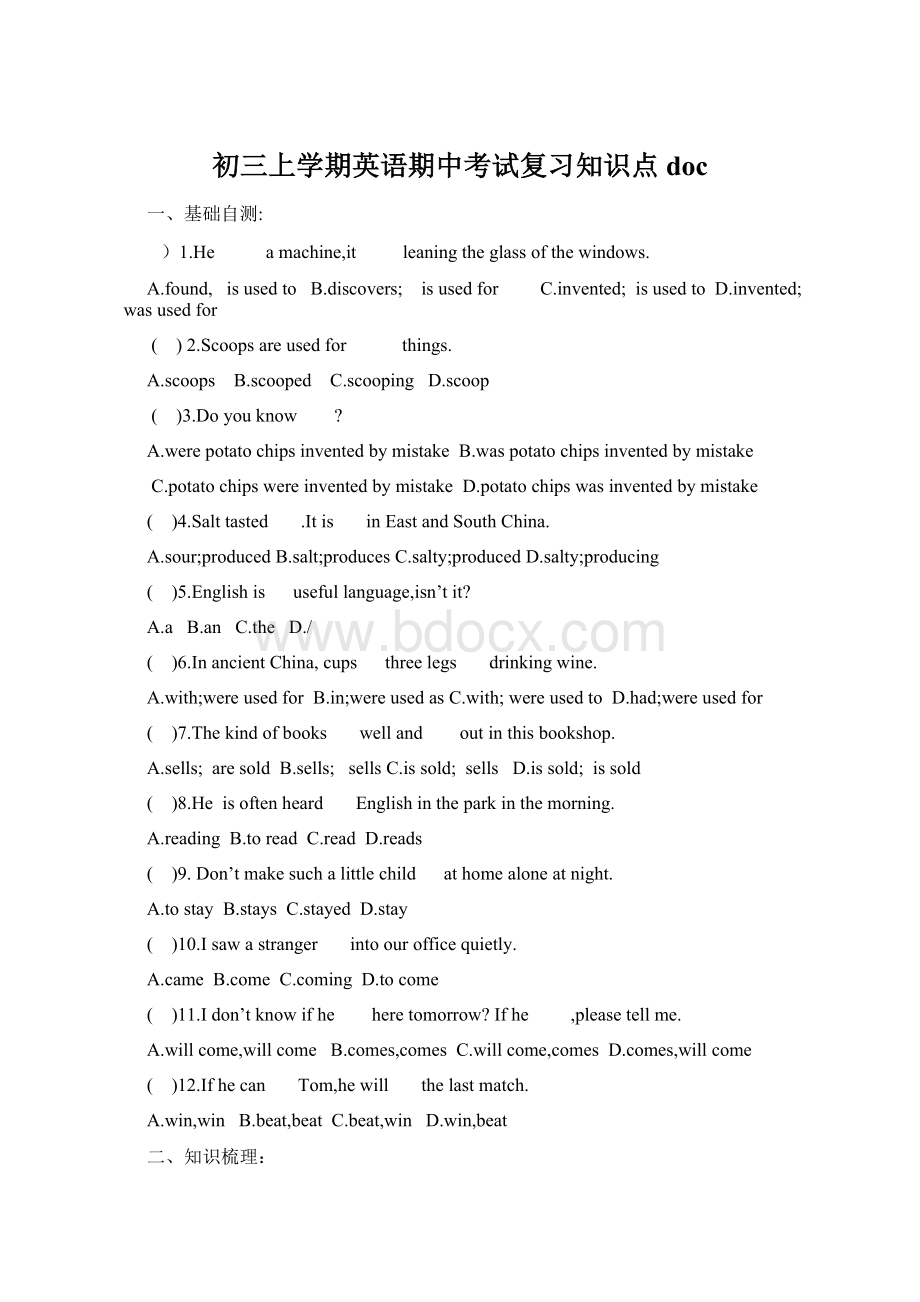 初三上学期英语期中考试复习知识点docWord文件下载.docx
初三上学期英语期中考试复习知识点docWord文件下载.docx
- 文档编号:18394019
- 上传时间:2022-12-16
- 格式:DOCX
- 页数:24
- 大小:38.54KB
初三上学期英语期中考试复习知识点docWord文件下载.docx
《初三上学期英语期中考试复习知识点docWord文件下载.docx》由会员分享,可在线阅读,更多相关《初三上学期英语期中考试复习知识点docWord文件下载.docx(24页珍藏版)》请在冰豆网上搜索。

C.potato
were
D.potato
)4.Salt
tasted
.It
in
East
and
South
China.
A.sour;
produced
B.salt;
produces
C.salty;
D.salty;
producing
)5.English
useful
language,isn’t
it?
A.a
B.an
C.the
D./
)6.In
ancient
China,
cups
three
legs
drinking
wine.
A.with;
B.in;
as
C.with;
D.had;
)7.The
kind
books
well
out
this
bookshop.
A.sells;
sold
B.sells;
sells
C.is
sold;
D.is
)8.He
often
heard
English
park
morning.
A.reading
B.to
read
C.read
D.reads
)9.
Don’t
make
such
little
child
at
home
alone
night.
A.to
stay
B.stays
C.stayed
D.stay
)10.I
saw
stranger
into
our
office
quietly.
A.came
B.come
C.coming
D.to
come
)11.I
don’t
if
he
here
tomorrow?
If
please
tell
me.
A.will
come,will
B.comes,comes
C.will
come,comes
D.comes,will
)12.If
can
Tom,he
will
last
match.
A.win,win
B.beat,beat
C.beat,win
D.win,beat
二、知识梳理:
Unit1
一、知识点
1.Checkin:
在旅馆的登记入住。
Checkout:
在旅馆结账离开。
2.By:
①通过…..方式(途径)。
例:
IlearnEnglishbylisteningtotapes.
②在…..旁边。
bythewindow/thedoor
③乘坐交通工具例:
bybus/car
④在……之前,到……为止。
byOctober在10月前
⑤被例:
Englishisspokenbymanypeople.
3.how与what的区别:
how通常对方式或程度提问,意思有:
怎么样如何,通常用来做状语、表语。
what通常对动作的发出者或接受者提问,意思为什么,通常做宾语,主语。
1What…thinkof…?
How…like…?
2What…dowith…?
How…dealwith…?
3What…likeabout…?
4What’stheweatherliketoday?
How’stheweathertoday?
5Whattodo?
Howtodoit?
e.g.Whatdoyouthinkofthisbook?
=Howdoyoulikethisbook?
Idon’tknowwhatIshoulddowiththematter.=Idon’tknowhowIshoulddealwithit.
WhatdoyoulikeaboutChina?
=HowdoyoulikeChina?
Idon’tknowwhattodonextstep?
=Idon’tknowhowtodoitnextstep?
㊣Whatgood/badweatheritistoday!
(weather为不可数名词,其前不能加a)
㊣Whatafine/baddayitistoday!
(day为可数名词,其前要加a)
4.aloud,loud与loudly的用法:
三个词都与"
大声"
或"
响亮"
有关。
①aloud是副词,重点在出声能让人听见,但声音不一定很大,
常用在读书或说话上。
通常放在动词之后。
aloud没有比较级形式。
如:
Hereadthestoryaloudtohisson.他朗读那篇故事给他儿子听。
②loud可作形容词或副词。
用作副词时,常与speak,talk,laugh等动词连用,多用于比较级,须放在动词之后。
Shetoldustospeakalittlelouder.她让我们说大声一点。
③loudly是副词,与loud同义,有时两者可替换使用,但往往
含有令人讨厌或打扰别人的意思,可位于动词之前或之后。
Hedoesnottalkloudlyorlaughloudlyinpublic.他不当众大声谈笑。
5.voice指人的嗓音也指鸟鸣。
sound指人可以听到的各种声音。
noise指噪音、吵闹声
6.join加入某团体并成为其中一员attend出席参加会议或讲座
joinin与takepartin指参加到某项活动中去。
7.all、both、always以及every复合词与not连用构成部分否定。
其完全否定为:
all---none,both---neither,everything---nothing,everybody---nobody.
8.beafraidofdoingsth./sth.害怕beafraidofbeingalone
beafraidtodosth.害怕
beafraidthat恐怕担心,表示委婉语气
9.either:
①放在否定句末表示“也”
②两者中的“任一”
③either…or…或者…或者.…引导主语部分,谓语动词按照就近原则
10.a,an与序数词连用表示“又一”,“再一”。
例:
Pleasegivemeasecondapple.
11.havetrouble/difficult/problem(in)doing…..干…..遇到麻烦,困难
12.unless除非,如果不,等于“ifnot”本身就表示否定,引导条件状语从句,主句为将来时,条件状语从句用一般现在时表示将来。
Mybabysisterdoesn’tcryunlessshe’shungry.
=Mybabysisterdoesn’tcryifsheisn’thungry.
Unlessyoutakemorecare,you’llhaveanaccident.
如果你不多加小心的话,你会出事的。
13.instead:
adv.代替,更换。
Wehavenocoffee,wouldyouliketeainstead?
我们没有咖啡了,改喝茶好吗?
Itwilltakedaysbycar,solet’sflyinstead.
开车去要好几天呢,咱们还是坐飞机吧。
Tomwasill,soIwentinstead.汤姆病了,所以换了我去。
insteadofdoingsth.作为某人或某事物的替换
Let’splaycardsinsteadofwatchingTV.
Wesometimeseatriceinsteadofpotatoes.
Givemetheredoneinsteadofthegreenone.
14.spoken口头的,口语的。
spokenEnglish口头英语
speaking讲话的,说某种语言的。
Speakingskills讲英语的能力
15.提建议的句子:
①What/howabout+doingsth.?
如:
What/Howaboutgoingshopping?
②Whydon’tyou+dosth.?
Whydon’tyougoshopping?
③Whynot+dosth.?
Whynotgoshopping?
④Let’s+dosth.如:
Let’sgoshopping
⑤Shallwe/I+dosth.?
Shallwe/Igoshopping?
16.too…to太…而不能常用的句型too+adj./adv.+todosth.
如:
I’mtootiredtosayanything.我太累了,什么都不想说。
17.not…atall一点也不根本不如:
Ilikemilkverymuch.Idon’tlikecoffeeatall.
我非常喜欢牛奶。
我一点也不喜欢咖啡。
not经常可以和助动词结合在一起,atall则放在句尾
18.be/getexcitedaboutsth.===be/getexcitedaboutdoingsth.
===beexcitedtodosth.对…感兴奋如:
Iam/getexcitedaboutgoingtoBeijing.===
IamexcitedtogotoBeijing.我对去北京感到兴奋。
19.①endupdoingsth终止做某事,结束做某事如:
Thepartyendedupsinging.晚会以唱歌而结束。
②endupwithsth.以…结束如:
Thepartyendedupwithhersinging.晚会以她的歌唱而告终。
20.firstofall首先
.tobeginwith一开始
lateron后来、随
21.also也、而且(用于肯定句)常在句子的中间
either也(用于否定句)常在句末
too也(用于肯定句)常在句末=aswell
22.makemistakes犯错
mistakesb.for…把……错认为……
makemistakes(in)doingsth.在干某事方面出错
bymistake错误地;
由于搞错
mistake---mistook----mistaken
Ioftenmakemistakes.我经常犯错。
Imistookhimforhisbrother.我错把他认成了他的哥哥。
makeamistake犯一个错误如:
Ihavemadeamistake.
我已经犯了一个错误。
23.laughatsb.笑话;
取笑(某人)
Don’tlaughatme!
不要取笑我!
24.enjoydoingsth.喜欢做…乐意做…如:
Sheenjoysplayingfootball.她喜欢踢足球。
enjoyoneself过得愉快如:
Heenjoyedhimself.他过得愉快。
25.oneof+(the+形容词最高级)+名词复数形式…其中之一
Sheisoneofthemostpopularteachers.她是最受欢迎的教师之一。
26.It’s+形容词+(forsb.)todosth.(对于某人来说)做某事…
It’sdifficult(forme)tostudyEnglish.对于我来说学习英语太难了。
句中的it是形式主语,真正的主语是tostudyEnglish
27.practicedoing练习做某事如:
SheoftenpracticespeakingEnglish.她经常练习说英语。
28.decidetodosth.决定做某事如:
LiLeihasdecidedtogotoBeiJing.李雷已经决定去北京。
29.dealwith处理如:
Idealtwithalotofproblem.
30.worryaboutsb./sth.担心某人/某事
Motherworriedabouthissonjustnow.妈妈刚才担心他的儿子。
31.beangrywithsb.对某人生气如:
Iwasangrywithher.我对她生气。
32.perhaps===maybe也许
33.goby(时间)过去如:
Twoyearswentby.两年过去了。
34.seesb./sth.doing看见某人正在做某事强调正在发生
seesb./sth.do看见某人在做某事如:
Shesawhimdrawingapictureintheclassroom.她看见他正在教室里画画。
35.regard…as…把…看作为….如:
TheboysregardedAnnaasafool.这些男孩把安娜看成傻瓜。
36.toomany 许多 修饰可数名词 如:
toomanygirls
toomuch 许多 修饰不可数名词如:
toomuchmilk
muchtoo 太 修饰形容词如:
muchtoobeautiful
37.change… into… 将…变为…
Themagicianchangedthepenintoabook.这个魔术师将这本书变为一本书。
38.withthehelpofsb.==withone’shelp在某人的帮助下
39.compare…to… 把…与…相比
CompareyoutoAnna,youarelucky.你和安娜相比,你是幸运的。
Unit2
1.usedto过去常常做某事,暗指现在已经不存在的动作或状态.后跟动词原形.usedtodosth.
Thereusedtobe….(反意疑问句)didn’tthere?
否定形式为:
didn’tuseto或usedn’tto
疑问形式为:
Did…useto…?
或Used…to…?
be/getusedtodoingsth.习惯于,to为介词.
2.wear表示状态.=bein+颜色的词
puton表示动作.
dress+人给某人穿衣服.dresssb./oneself
haveon表示状态(不用于进行时态)
5.反意疑问句:
①陈述部分的主语为this,that,疑问部分主语用it;
陈述部分主语用these,those,疑问部分用they做主语.
例:
Thisisanewstory,isn’tit?
Thoseareyourparents,aren’tthey?
②陈述部分是therebe结构,疑问部分仍用there
TherewasamannamedPaul,wasn’tthere?
③Iam后的疑问句,用aren’tI
IaminClass2,aren’tI?
④陈述部分与含有not,no,never,few,little,hardly,seldom,neither,none等词时,疑问部分用肯定.
Fewpeoplelikedthismovie,didn’tthey?
但陈述句中若带有否定前缀或后缀的单词时,这个句子仍视为肯定,后面仍用否定.
Yoursisterisunhappy,isn’tshe?
⑤陈述部分的主语若为不定式或V-ing短语,疑问部分主语用it.
Tospendsomuchmoneyonclothesisunnecessary,isn’tit?
⑥陈述句中主语是nobody,noone,everyone,everybody等指人的不定代词时,疑问部分用they做主语;
若陈述部分主语是something,anything,noting,everything等指事物的不定代词时,疑问部分用it做主语.
Nobodysaysonewordabouttheaccident,dothey?
Everythingseemsperfect,doesn’tit?
⑦当主语是第一人称I时,若谓动为think,believe,guess等词时,且其后跟宾丛,这时疑问句部分的人称,时态要与宾语从句保持一致,同时还要考虑否定转移.
Idon’tthinkhecanfinishtheworkintime,canhe?
⑧前面是祈使句,后用willyou?
(let’s开头时,后用shallwe?
)
6.beterrifiedof害怕的程度比beafraidof深.
8.nomore(用在句中)=not…anymore(用在句尾)指次数;
nolonger(用在句中)=not…anylonger(用在句尾)指时间.
11.afford+n./pron.afford+todo常与can,beableto连用.
Canyouaffordanewcar?
Thefilmcouldn’taffordtopaysuchlargesalaries.
12.aswellas连词,不但…而且…强调前者.(若引导主语,谓动与前者在人称和数上一致
Livingthingsneedairandlightaswellaswater.
生命不仅需要水,还需要空气和阳光.
Iaswellastheyamreadytohelpyou.
不仅是他们,我也愿意帮助你.
13.alone=byoneself独自一人.lonely孤独的,寂寞的.
17.①be/becomeinterestedinsth.对…感兴趣
②beinterestedindoingsth.对做…感兴趣
③showgreatinterestin在……方面产生极大的兴趣
④aplaceofinterest一处名胜someplacesofinterest
Heisinterestedinmath,butheisn’tinterestedinspeaking
English.他对数学感兴趣,但是他对说英语不感兴趣。
⑤interestedadj.感兴趣的,指人对某事物感兴趣,往往主语是人
⑥interestingadj.有趣的,指某事物/某人具有趣味,主语往往是物
⑦aninterestingbook/man
18.害怕…beterrifiedofsth.如:
Iamterrifiedofthedog.
beterrifiedofdoingsth.如:
Iamterrifiedofspeaking.
21.spend动词,表示“花费金钱、时间”
①spend…onsth.在某事上花费(金钱、时间)
②spend…doingsth.花费(金钱、时间)去做某事 如:
Hespendstoomuchtimeonclothes.他花费太多的时间在衣着
Hespend3monthsbuildingthebridge.他花费了三个月去建这座桥。
payfor花费
Ipay10yuanforthebook.我花了10元买这本书。
take动词有“花费”的意思 常用的结构有:
Ittake(s)sb.…todosth.如:
Ittakesmeadaytoreadthebook.
22.chatwithsb.与某人闲聊 如:
Iliketochatwithhim.
我喜欢和他聊天。
23.worryaboutsb./sth.担心某人/某事 worry是动词
beworriedaboutsb./sth.担心某人/某事 worried是形容词
Don’tworryabouthim.不用担心他。
Motherisworriedaboutherson.妈妈担心他的儿子。
24.allthetime一直、始终
25.takesb.to+地方 送/
- 配套讲稿:
如PPT文件的首页显示word图标,表示该PPT已包含配套word讲稿。双击word图标可打开word文档。
- 特殊限制:
部分文档作品中含有的国旗、国徽等图片,仅作为作品整体效果示例展示,禁止商用。设计者仅对作品中独创性部分享有著作权。
- 关 键 词:
- 初三 上学 英语 期中考试 复习 知识点 doc
 冰豆网所有资源均是用户自行上传分享,仅供网友学习交流,未经上传用户书面授权,请勿作他用。
冰豆网所有资源均是用户自行上传分享,仅供网友学习交流,未经上传用户书面授权,请勿作他用。


 转基因粮食的危害资料摘编Word下载.docx
转基因粮食的危害资料摘编Word下载.docx
